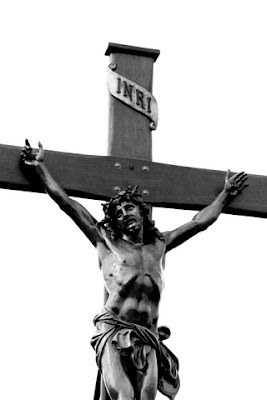Otherness - the word has an absolute and terrifying abstractness that confronts us even before we have pause to define the terms. The word has grandiose philosophical power. In the German theological tradition, the Andere (Other) is always expressed with the gravest of profundity.
As we enter into Good Friday, I'm thinking about the Otherness of those around me. Racism, bullying, profiling - all are aspects of defining myself against the other person. This Otherness is built into the critique of transcendence that is profoundly crucial to the Christian tradition. Otherness is the distance between a holy, just, and perfect God and a sinful humanity. But Otherness is also built into our verticality - our relationship with others. As Bonhoeffer discusses this, he senses in the story of Adam that in Adam's attempt to become an individual, to undercut God with abstract logic rather than remain in obedience, this desire and reality cuts him off from the life of God. But in becoming an Other - one which is like God, this radically puts him at odds with himself as well, which inevitably means other individuals too are at odds with themselves and with others. Individuality is the curse built into the Creation story. Bonhoeffer does not discuss Trinity as this point, but there is a tempting aspect here as well.
Overcoming Otherness in Christ is not simply being kind to others, sympathizing, or even empathizing with others. Jesus shows us that the only possibility of overcoming Otherness is not my proximity to another individual but overcoming the gulf of transcendence by bringing together that which is perfect and holy in God with that which is imperfect and profane in humanity. Jesus Christ does this in the cross. The cross does not reveal this to us outrightly. It is a life obediently taken up in service to the Other that reveals in the cross (the full express of servitude) that the incarnation reveals this truth. The Incarnation as the joining of humanity and God is the overcoming of this Otherness.
How than do we overcome Otherness as Christians? We must still represent ourselves in this humanity, our proclivity to sin, yet in the salvation of Christ, which is anticipated in God taking up humanity not as something that is to come but something that is. In practicality we struggle with sin because final redemption awaits us. But in those moments where righteousness breaks through, that interpretation is the life of God in me, domesticated in the person of Christ. Sinfulness is not only some failure of the moral commandment, it is separation. Paul can say that Jesus becomes sin because Jesus can also say My God, My God, why have you forsaken me? Sin is separation from the life of God. Yet what Jesus has over us is that if Jesus is sin he nevertheless remains obedient. We keep the life of God in tension with our own humanity. It is a tension the Bible tells us that Jesus himself takes up, in God and man, in righteousness and sinfulness. This is why sin has no final power as the moral commandment. And this is what Easter is about. As the old Easter hymn goes:
The strife is ov'r, the battle won, now is the victor's triumph won, oh let the song of praise be sung. Hallelujah!

No comments:
Post a Comment